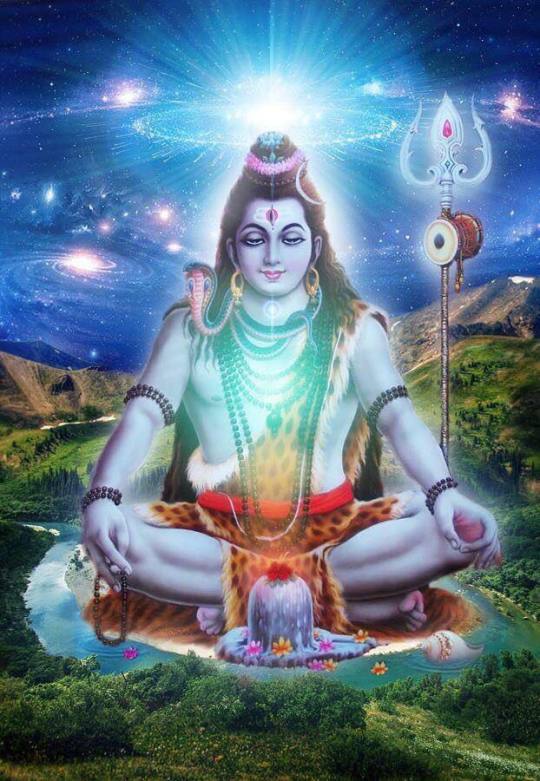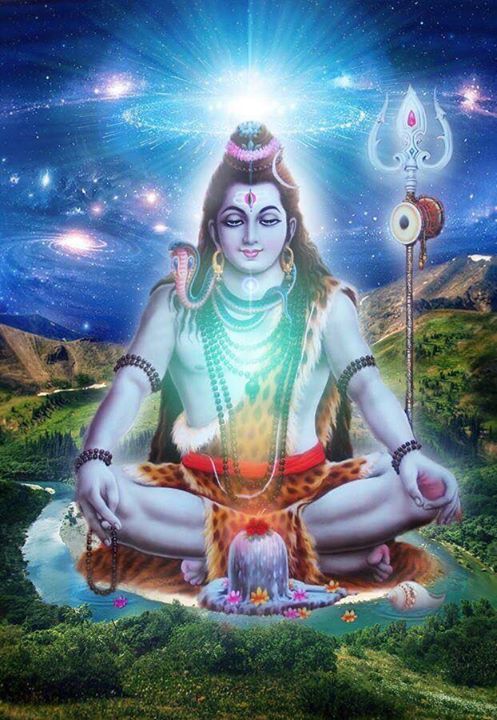#untransgressed
Photo

Shiva, the Lord of Time - TemplePurohit.com YajurVeda salutes Lord Shiva by stating: नमो अग्रियाय च प्रथमाय च [YajurVeda Taittariya Samhita 4.5.5.2] Namo Agriyaya cha prathamaya cha Salutations to Him who was before all things and who is foremost. Thus there is no effect of time for Lord Shiva as he was before the time. This is expanded in Taittariya Aranyaka of YajurVeda as: वामदेवाय नमो ज्येष्ठाय नमः श्रेष्ठाय नमो रुद्राय नमः कालाय नमः कलविकरणाय नमो ।। “vāmadēvāya namō jyēṣṭhāya namaḥ śrēṣṭhāya namō rudrāya namaḥ kālāya namaḥ kalavikaraṇāya namō |” (Taittiriya Aranyaka 10.18.1) Here the emphasis is in: रुद्राय नमः कालाय नमः कलविकरणाय नमो ।। rudrāya namaḥ kālāya namaḥ kalavikaraṇāya namō | Salutations to Rudra. Salutation to him who is time. Salutations to him who is the cause of evolution of universe. Salutations to him who is time/ कालाय नम: is expanded by Shiva Purana as below: Chapter 8&9 of Vaayaveeyasamhita Section of Shiva Purana mentions SaakshatShiva as Lord Kaala and time as Energy of Paramesvara. Sages asked Vayu, O skill one, please tell us. Who is this Lord Kaala? Under whose control is he? Who does not come under his control? Then Vayu said, It is the great splendor of Lord Shiva named Kaalatman. Kalaa, Kaastha, Nimesha are the forms it embodies. It is the power of Lord that controls the Universe in the form of directives which are untransgressable to the universe consisting of mobile and immobile beings. The Universe is under the control of Kaala. Kaala is not under the control of Universe. Kaala is under the control of Shiva. Shiva is not subject to its control. Since the unobstructed splendor of Shiva is firmly fixed in Kaala the limit of Kaala is extensive and untransgressable. He who thus correctly understands the principle of Kaala goes beyond the time and sees that which is beyond Kaala. Obeisance to Shiva of wonderful form who has no Kaala to influence him, no bondage and liberation, is identical neither with Purusha or Prakriti nor the universe. A day of Brahma's life constitutes life of 14 Indras. A day of Vishnu is life time of Brahma. A day of Rudra is life time of Vishnu. A day of Shiva is life time of Rudra. A day of SadaaShiva is life period of Shiva. A day of SAAKSHAATSHIVA is life period of SadaaShiva. This Kaala functions as directed by Saakshat Shiva. O Brahmins, this is the period of time of creation as mentioned by me. This Kaalantara shall be known as day of Parameswara. Parameswara's night shall be known to extend so long. His day is period of creation. His night is period of dissolution. But understand he has neither day or night as we conceive them. The dissolution is effected for the benefits of the world. The subjects, the Prajapathis, the three deities, Gods, Asuras, the sense organs, the sensual objects, the five great elements, the subtle and gross elements, the cosmic intellect, the deities, all these abide during the day of Paramesvara. They get dissolved at end of the day. At the end of night again begins the origin of universe. Obeisance to the great Shiva, the soul of the universe, whose energy in respect of activity, time, innate nature is untransgressable and under whose command the whole universe functions. https://ift.tt/3t3cvNf
27 notes
·
View notes
Text
Finding Refuge in Alienation and Ambivalence
Perhaps it's due to the combination of the intensity of NYC's COVID-19 crisis in the spring and America's politics as usual—police killings, white supremacists, libertarian mask-rejectors, irate people throwing objects in retail spaces, mediocre Democrats, an approaching hurricane season amid persistent inaction on confronting the climate crisis, etc.—but I'm finding it difficult to get through Deaths of Despair. It's as though I've arrived at, for the first time, a previously untransgressed limit to my witnessing and consuming information about the utter depravity of America.
Since my late teens, I've been continuously engaged in political agitation of some sort or in journalism. This isn't new terrain for me. But whether it's the intensity of the past few months or the cumulative experience of a lifetime, the ugliness of American society, the vitality of resistance in the streets and organizing among those seeking a more-just world not withstanding, feels as if it’s becoming overwhelming.
As much as I'm acutely aware of the power of prose—it's why I became a writer, after all—it feels shallow to admit that a book, an academic one no less, is the red light flashing on and off signaling "change direction," which in this circumstance means turning to a Rachel Cusk novel about the much more comfortable themes to me of alienation and ambivalence toward the world.
I cannot recall ever averting my gaze from something or from feeling as though I wasn’t prepared to grapple with the sheer brutality of living in America. I avoided footage of Islamic State torture and killings, but watching those images in 2015, say, felt gratuitous rather than deeply affecting.
I can already hear the critique: privilege. Who does he think he is, in other words, expressing a hard limit on the emotional exposure to the cruel society that is so much crueler to other people than him and who cannot take a time out? That argument, though, only allows the most abused—and it could be only one person—to claim authenticity to feeling the blunt end of America’s brutality and raising their hand to say, “I’ve had enough.” It also ignores my own experiences, which I refuse to offer an account of in an effort to claim the right to take a break from Deaths of Despair—or despair in general. And, besides, my turn to Cusk will certainly not change in any way my material conditions. It allows me only brief emotional respite, which, I argue, is not an insignificant necessity to live.
What matters, after all, isn’t how high or low my threshold for consuming representations of American depravity may be, or whether I’ve stared down the barrel of a police officer’s gun or faced the humiliation of being laid off. What matters is the strength and sustainability of my commitment—the commitment from each of us for that matter—to changing the disparities in power between workers and bosses, members of society and the men and women with guns who police them without accountability, those in need of health care and those that profit from denying care, the refugee and the official who calls in the airstrikes.
And that commitment, at least for me at the moment, needs the girding of Cusk’s ambivalence about the world. Retreating into the comfort of quotidian alienation—and because it's autofiction, Cusk’s ambiguous genre form—means I can sustain the will to remain an anti-capitalist dissident in a very cruel America.
0 notes
Photo

Shiva, the Lord of Time - TemplePurohit.com YajurVeda salutes Lord Shiva by stating: नमो अग्रियाय च प्रथमाय च [YajurVeda Taittariya Samhita 4.5.5.2] Namo Agriyaya cha prathamaya cha Salutations to Him who was before all things and who is foremost. Thus there is no effect of time for Lord Shiva as he was before the time. This is expanded in Taittariya Aranyaka of YajurVeda as: वामदेवाय नमो ज्येष्ठाय नमः श्रेष्ठाय नमो रुद्राय नमः कालाय नमः कलविकरणाय नमो ।। “vāmadēvāya namō jyēṣṭhāya namaḥ śrēṣṭhāya namō rudrāya namaḥ kālāya namaḥ kalavikaraṇāya namō |” (Taittiriya Aranyaka 10.18.1) Here the emphasis is in: रुद्राय नमः कालाय नमः कलविकरणाय नमो ।। rudrāya namaḥ kālāya namaḥ kalavikaraṇāya namō | Salutations to Rudra. Salutation to him who is time. Salutations to him who is the cause of evolution of universe. Salutations to him who is time/ कालाय नम: is expanded by Shiva Purana as below: Chapter 8&9 of Vaayaveeyasamhita Section of Shiva Purana mentions SaakshatShiva as Lord Kaala and time as Energy of Paramesvara. Sages asked Vayu, O skill one, please tell us. Who is this Lord Kaala? Under whose control is he? Who does not come under his control? Then Vayu said, It is the great splendor of Lord Shiva named Kaalatman. Kalaa, Kaastha, Nimesha are the forms it embodies. It is the power of Lord that controls the Universe in the form of directives which are untransgressable to the universe consisting of mobile and immobile beings. The Universe is under the control of Kaala. Kaala is not under the control of Universe. Kaala is under the control of Shiva. Shiva is not subject to its control. Since the unobstructed splendor of Shiva is firmly fixed in Kaala the limit of Kaala is extensive and untransgressable. He who thus correctly understands the principle of Kaala goes beyond the time and sees that which is beyond Kaala. Obeisance to Shiva of wonderful form who has no Kaala to influence him, no bondage and liberation, is identical neither with Purusha or Prakriti nor the universe. A day of Brahma's life constitutes life of 14 Indras. A day of Vishnu is life time of Brahma. A day of Rudra is life time of Vishnu. A day of Shiva is life time of Rudra. A day of SadaaShiva is life period of Shiva. A day of SAAKSHAATSHIVA is life period of SadaaShiva. This Kaala functions as directed by Saakshat Shiva. O Brahmins, this is the period of time of creation as mentioned by me. This Kaalantara shall be known as day of Parameswara. Parameswara's night shall be known to extend so long. His day is period of creation. His night is period of dissolution. But understand he has neither day or night as we conceive them. The dissolution is effected for the benefits of the world. The subjects, the Prajapathis, the three deities, Gods, Asuras, the sense organs, the sensual objects, the five great elements, the subtle and gross elements, the cosmic intellect, the deities, all these abide during the day of Paramesvara. They get dissolved at end of the day. At the end of night again begins the origin of universe. Obeisance to the great Shiva, the soul of the universe, whose energy in respect of activity, time, innate nature is untransgressable and under whose command the whole universe functions. https://ift.tt/2FwiG6v
0 notes